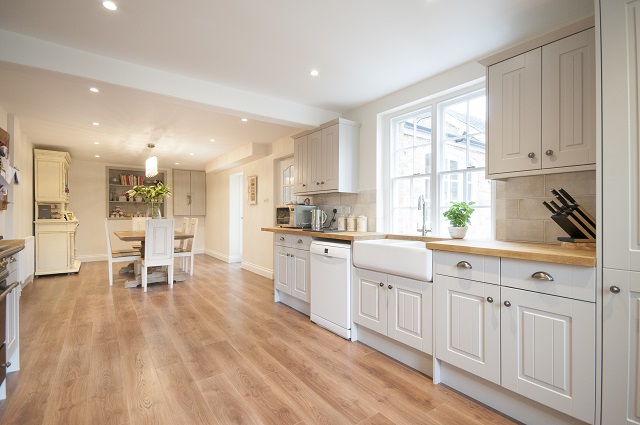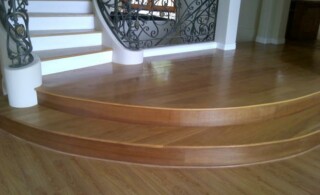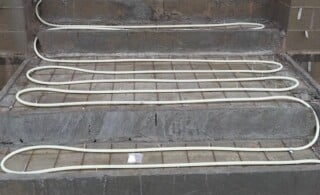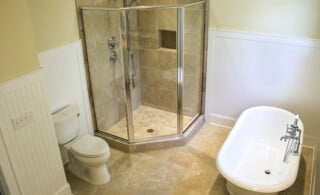
A good hardwood finish protects your flooring and gives it a sleek and beautiful appearance. You can choose from a DIY-friendly water-based polyurethane, a professional acid-cured finish, a classic oil sealer, and more. We’ll walk you through the top seven hardwood floor finishes, along with their characteristics, pros, and cons.
On This Page:
- Acid-Cured
- Aluminum Oxide
- Water-Based Poly
- Oil-Based Poly
- Moisture-Cured
- Oil Sealer
- Hard Wax Oil
- FAQs
1. Best Hardwood Floor Finish: Acid-Cured
Acid-cured finish, also known as “Swedish finish,” stands as the top pick and most popular choice for hardwood floors. This professional application uses alcohol and acid for a varnish that dries in a snap and holds up beautifully. However, it can take up to three months to fully cure, and you can’t place area rugs over it for about two weeks. Once complete, it shows off all the character of exotic species like Brazilian Cherry.
This type of finish will last up to 10 or more years with good care, and you can touch it up as needed.
But it’s important to note that Swedish finish is high in volatile organic compounds (VOCs) and releases gasses during application and for a few days after, so it requires special precautions during installation. Homeowners should plan to find other accommodations for a day or two after it’s installed, and remove plants and pets from the work area.
2. Most Durable Hardwood Floor Finish: Aluminum Oxide
Aluminum oxide is the finish you buy when you are interested in easy installation and longevity. It comes already installed on some prefinished hardwood flooring. Rated to last up to 25 years in a single application, it makes the surface much less likely to scratch or fade.
Although this type offers supreme durability, it’s difficult to refinish—but not impossible. When it wears out, you can sand it. If the finish is a problem to remove, you can spray a softener on the flooring to soften the aluminum oxide coating.
Ready to start your Hardwood Finishing Project?
Find Pros3. Best Way to Finish Basement Floor: Water-Based Polyurethane
Water-based polyurethane is a standard choice for many environments, but especially those with more moisture. Homeowners often find this finish easy to apply, making it a reasonable DIY project.
It dries clear in a few hours, so you can put on multiple coats in one day. Although it’s not as durable as oil-based options, it has low VOCs. That makes it a better choice for the basement or other rooms with minimal ventilation.
4. Best Hardwood Floor Finish for High-Traffic: Oil-Based Polyurethane
Oil-based polyurethane offers middle-of-the-road durability at an affordable price. The least expensive of the modern finishes, this type adds a warm glow to popular wood flooring options like white oak or maple. Athletic floors use oil modified polyurethane—and there’s a reason why street shoes aren’t allowed on your high school gymnasium’s floor. But its soft finish is ideal for traction in sports.
Unlike the old-school oil sealer, it dries hard with several hours between coats. It costs less than water-based polyurethane, and usually needs fewer layers for the same finish. Homeowners should note that oil-based polyurethane has very low UV protection, so it yellows quickly when exposed to frequent sunlight.
5. Best Wood Floor Finish for Kids and Pets: Moisture-Cured Urethane
Moisture-cured urethane provides an extremely durable surface. The preferred option for bowling alleys, this finish can take whatever you want to throw at it without a scratch or scuff. However, it’s not commonly used in residential wood flooring due to health concerns over exposure to its solvents; it’s mainly for industrial use.
Moisture-cured urethane dries in one to two hours, making it difficult to apply. This means you’ll need to look for professional hardwood refinishing near you if you opt for a moisture-cured urethane finish.
6. Best Hardwood Finish for Historic Homes: Penetrating Oil Sealer
Although newer finishes make most of the old approaches obsolete, many owners of older homes still love the penetrating oil sealer. This traditional product typically uses tung oil, which absorbs well into wood and gives a low-gloss shine.
Oil sealer serves as a simple DIY project for patient people. It takes as much as one to two days to dry between coats. It’s not as durable as modern options, which means you may need to touch it up every two to three years.
7. Most Environmentally-Friendly Hardwood Finish: Hard Wax Oil
Hardwax oil is one of the more environmentally-friendly hardwood floor finishes. This type of finish is made from vegetable oils and waxes, which helps it to achieve low to no sheen. It’s also durable, and comes with a wide variety of color possibilities. Homeowners who enjoy a little DIY work can benefit from the ease of maintenance on this type of finish. Another perk of hard wax oil finish is its low—and in some cases, non-existent—VOC levels.
Ready to start your Hardwood Finishing Project?
Find ProsFrequently Asked Questions
What is the hardest wood floor finish?
The hardest wood floor finish is aluminum oxide, but it only comes on prefinished boards. If you want something durable you can add after installation, acid-cured is your best bet. The key to the longevity of any type of wood floor is a maintenance coat when a traffic pattern begins to show in high traffic areas.
What hardwood floor finish is best for dogs?
Moisture-cured urethane is the most durable finish for homes with pets. However, It contains a lot of (VOCs) that can aggravate pets and people, especially at first. If you’re looking for a low-VOC alternative, water-based polyurethane is your best bet.
What is the best brand of polyurethane for hardwood floors?
Bona sells several highly-rated polyurethane hardwood floor finish products, typically through small, local distributors. Brands like DuraSeal or Minwax also rank well for durability and ease of application. They are available at businesses such as Walmart and Amazon.
Do you need to seal hardwood floors?
You have to seal unfinished hardwood floors to protect them from scratches and stains. The frequency depends on the type, but in general it’s ideal to refinish them between four and six times in their lifetime. This comes out to about every seven to 10 years.
Refinishing hardwood floors costs $1,100 to $2,400.
What’s the difference between wood stain and finish?
Wood stain adds a color to the surface. A finish adds a level of shine (e.g. matte, low-gloss, high-gloss) and seals the grain to protect against damage. Some companies, such as Minwax, offer products that do both at once.
 Which Carpet Is Best for a Basement?
Which Carpet Is Best for a Basement?  Prefinished versus Unfinished Wood Flooring – Pros & Cons
Prefinished versus Unfinished Wood Flooring – Pros & Cons  How to Remove Pet Odor From Your Carpets
How to Remove Pet Odor From Your Carpets  Radiant Floor Heating – How it Works & Benefits
Radiant Floor Heating – How it Works & Benefits  Is It Possible to Level a Bathroom Floor?
Is It Possible to Level a Bathroom Floor? 

Are You Familiar With This Topic? Share Your Experience.